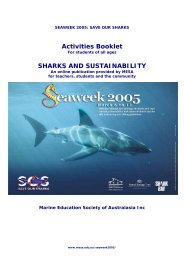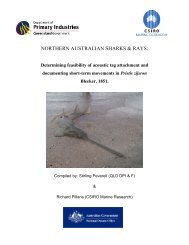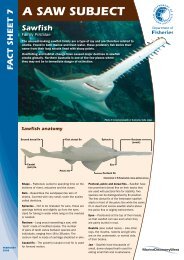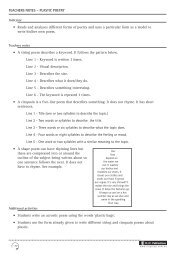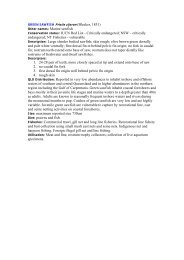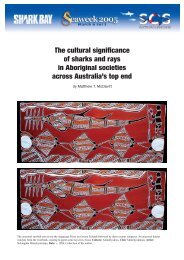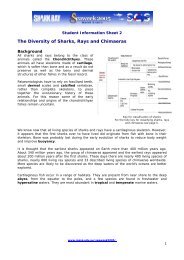September 2005 - Marine Education Society of Australasia
September 2005 - Marine Education Society of Australasia
September 2005 - Marine Education Society of Australasia
You also want an ePaper? Increase the reach of your titles
YUMPU automatically turns print PDFs into web optimized ePapers that Google loves.
“Plastic bags are a problem there. The wind<br />
blows them into the water. No-one wants<br />
this to happen, it just does” Bradley Wall,<br />
North Haven Junior Dolphin Guardian.<br />
On World Environment Day they began<br />
selling paper bags and multi-use bags at the<br />
entrances to the market. Hoping that people<br />
will make the change from plastic bags, they<br />
also put up posters and banners with the<br />
slogan “Please help us to help the dolphins”.<br />
Junior Dolphin Rangers have been actively<br />
working to protect the dolphins and their<br />
environment through school and community<br />
programs. The launch <strong>of</strong> the Adelaide<br />
Dolphin Sanctuary, the Adelaide Dolphin<br />
Sanctuary <strong>Education</strong> Resource and the<br />
Junior Dolphin Guardian program marks a<br />
turning point in the protection <strong>of</strong> not only<br />
the dolphins but the Port River and Barker<br />
Inlet Estuary and will encourage more young<br />
people to engage in environmental action to<br />
protect the dolphins and their habitat.<br />
For further information about the Junior<br />
Dolphin Guardian program you can visit the<br />
website<br />
http://www.environment.sa.gov.au/coasts/do<br />
lphin_sanctuary/ or contact me on the<br />
details below.<br />
Verity Bone<br />
Environmental <strong>Education</strong> Officer<br />
Department for Environment and Heritage,<br />
South Australia<br />
P: (08) 8463 3912<br />
E: bone.verity@saugov.sa.gov.au<br />
Byron <strong>Marine</strong> Wildlife Series<br />
Barb Jensen, MESA.<br />
An initiative sparked by Seaweek is building<br />
local interest in the marine environment <strong>of</strong><br />
Cape Byron <strong>Marine</strong> Park. Information<br />
evenings have been very well attended and<br />
the Byron Underwater Research Group has<br />
formed. Through slides, (some amazing audio<br />
and images) and discussion the local<br />
community has the opportunity to learn more<br />
about the marine life, the local research<br />
projects and other programs linked to our<br />
marine environments. And for those with the<br />
time and skills, the Research Group is<br />
planning to get wet, explore and study the<br />
area.<br />
An incredible sequence <strong>of</strong> the white<br />
humpback whale breaching instantly<br />
connected everyone in the audience<br />
positively to the marine environment, a<br />
powerful first step towards taking action to<br />
protect and conserve. Congratulations to the<br />
work and enthusiasm <strong>of</strong> Brian <strong>of</strong> Coastcare<br />
and Jackie <strong>of</strong> the MPA.<br />
<strong>Marine</strong> Discovery Centres…..<br />
Schoolkids getting dune and dirty<br />
for the environment<br />
Media Release<br />
July <strong>2005</strong><br />
Volunteers from primary and secondary<br />
schools and others from community groups<br />
are again heading for the beach this year, to<br />
help save the fragile dune systems along the<br />
surf coast.<br />
The Department <strong>of</strong> Primary Industries<br />
<strong>Marine</strong> Discovery Centre at Queenscliff<br />
began the restoration program 21 years ago.<br />
The program coordinator, Tara Ellard, said<br />
volunteers would be laying down native tree<br />
prunings to stabilise areas <strong>of</strong> bare or<br />
damaged sand dunes.<br />
“The brush helps trap sand and windblown<br />
seed and, as it breaks down, it provides<br />
nutrients to the growing plants,” Ms Ellard<br />
said.<br />
“Locally indigenous plant species are then<br />
planted among the brush to help stem<br />
further erosion.”<br />
Without restoration <strong>of</strong> these primary dunes<br />
the areas <strong>of</strong> erosion or ‘blowouts’ would<br />
increase. This erosion may lead to loss <strong>of</strong><br />
valuable habitat further into the dunes.<br />
This year’s program runs from the 18 th <strong>of</strong><br />
July until August the 12 th at the following<br />
sites:<br />
12



